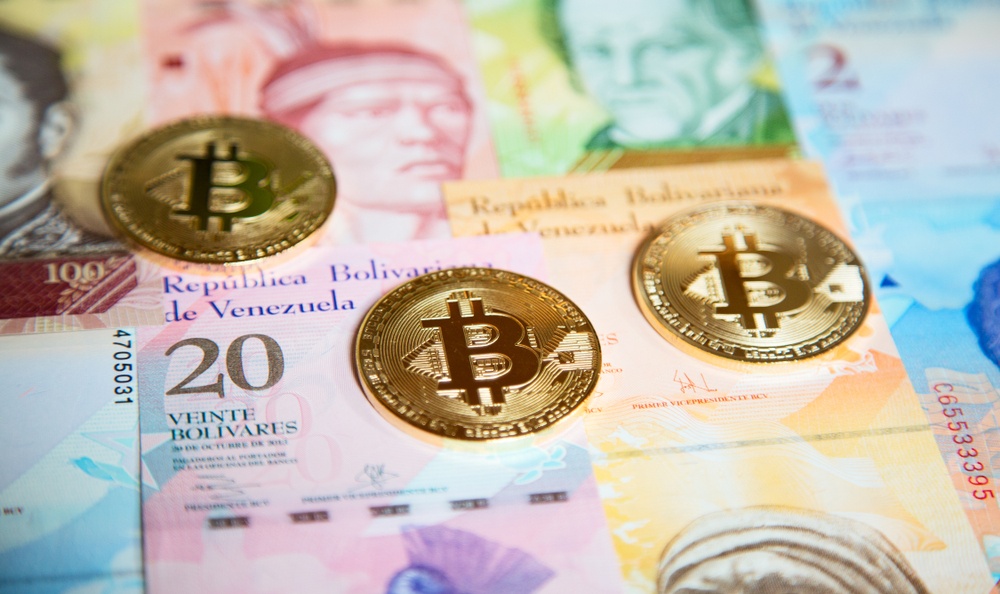Bitcoin Trading in Venezuela Just Hit an All-Time High Despite a 40% Price Premium

Peer-to-peer bitcoin trading volumes in Venezuela just hit an all-time weekly high. | Source: Shutterstock
According to the data provided by LocalBitcoins, a peer-to-peer cryptocurrency trading platform, the weekly volume of Bitcoin in Venezuela achieved a new all-time high.
Measured in Bitcoin, the weekly volume of the BTC-to-Venezuelan bolivar (VES) pair increased to 2,454 BTC. In U.S. dollars, that is worth $8.95 million per week and $1.29 million per day.
Matt Odell, a cryptocurrency researcher, said that the volume would be higher if the 40 percent premium in the Venezuelan market is priced in.
Had the high premium of Bitcoin due to its scarcity in the Venezuelan market been considered, the volume could reach around $14 million at $5,800 per Bitcoin.
Demand For Bitcoin in Venezuela is Skyrocketing
Amidst an intense economic recession and uncertainty in the country’s government, the Venezuelan bolivar has essentially become valueless.
The people of Venezuela have continued to suffer from a lack of basic necessities in the past several months. The situation has noticeably worsened when the government blocked U.S. humanitarian aid from coming into the country through the Columbian border.
NBCNews reported that sacks of rice, canned tuna, and biscuits packed by volunteers were stopped by the border by the Nicolas Maduro administration, which is scrambling to remain in power following the emergence of opposition leader Juan Guaidó.
Lester Toledo, the representative of the aid mission led by Guaidó remains optimistic that the aid will be let into the country to help tens of thousands of malnourished children.
“I am convinced that the way we are going to pass this aid is with the Venezuelan people. People, people and more people bringing in humanitarian aid,” Toledo said.
But, the humanitarian aid sent by the U.S. government is continued to be stopped at the border by the Venezuelan military and it is uncertain when it will be let through.
The Venezuelan people are finding it difficult to wait for the government to open its border and welcome the assistance from the U.S. government. As long as Nicolas Maduro finds a way remains in power, the military is expected to prevent any aid from coming into the country.

In recent weeks, Venezuelans have turned to Bitcoin for hope, attempting to utilize the digital currency to purchase foods and necessities.
Previously, Reason.com revealed that many individuals in Venezuela were mining Bitcoin using the country’s cheap electricity to acquire the digital currency and order packages of food and medicine.
Jim Epstein said in 2017:
[T]he main factor driving Venezuelans to take up bitcoin mining is a price control put in place by the socialist government: Electricity is virtually free.
Bitcoin mining requires a lot of computer processing power, which in turn requires a lot of electricity. In most of the world, utility bills eat into the cost of mining. In places where energy prices are high, it can even be a losing proposition. But in Venezuela, the government has turned bitcoin mining into something akin to owning a home mint.
Will the Volume of Bitcoin Continue to Increase?
As CCN.com reported, Venezuela’s opposition leader Guaidó is pro-Bitcoin and publicly expressed his skepticism towards the Petro, a cryptocurrency developed by the Maduro administration.
It is highly unlikely for Bitcoin to become the main currency of Venezuela in the foreseeable. If a new administration takes into effect, it will attempt to revive the national currency.
But, as RT host Max Keiser explained, Bitcoin is operating as a lifeline to many Venezuelan residents and it will continue to do so in the foreseeable future.
“Acting Venezuelan President is a fan of Bitcoin. Good News, Maduro’s Petro was never gonna work. Converting economy over to Bitcoin would be the smartest thing they could do.”